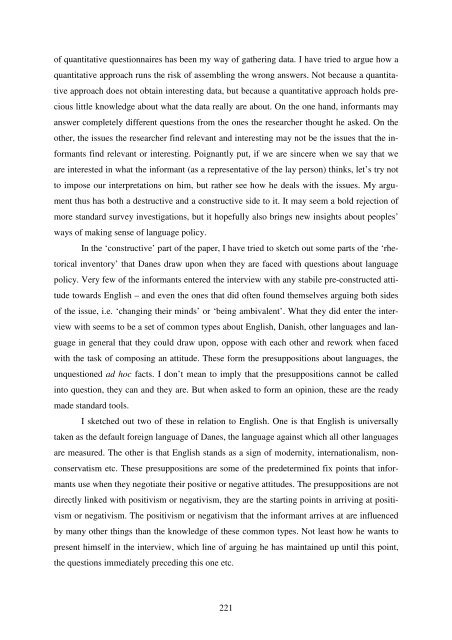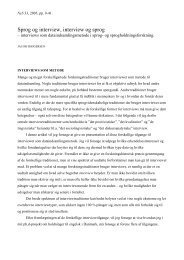Hør dog hvad de siger - Note-to-Self: Trials & Errors
Hør dog hvad de siger - Note-to-Self: Trials & Errors
Hør dog hvad de siger - Note-to-Self: Trials & Errors
Create successful ePaper yourself
Turn your PDF publications into a flip-book with our unique Google optimized e-Paper software.
of quantitative questionnaires has been my way of gathering data. I have tried <strong>to</strong> argue how a<br />
quantitative approach runs the risk of assembling the wrong answers. Not because a quantita-<br />
tive approach does not obtain interesting data, but because a quantitative approach holds pre-<br />
cious little knowledge about what the data really are about. On the one hand, informants may<br />
answer completely different questions from the ones the researcher thought he asked. On the<br />
other, the issues the researcher find relevant and interesting may not be the issues that the in-<br />
formants find relevant or interesting. Poignantly put, if we are sincere when we say that we<br />
are interested in what the informant (as a representative of the lay person) thinks, let’s try not<br />
<strong>to</strong> impose our interpretations on him, but rather see how he <strong>de</strong>als with the issues. My argu-<br />
ment thus has both a <strong>de</strong>structive and a constructive si<strong>de</strong> <strong>to</strong> it. It may seem a bold rejection of<br />
more standard survey investigations, but it hopefully also brings new insights about peoples’<br />
ways of making sense of language policy.<br />
In the ‘constructive’ part of the paper, I have tried <strong>to</strong> sketch out some parts of the ‘rhe-<br />
<strong>to</strong>rical inven<strong>to</strong>ry’ that Danes draw upon when they are faced with questions about language<br />
policy. Very few of the informants entered the interview with any stabile pre-constructed atti-<br />
tu<strong>de</strong> <strong>to</strong>wards English – and even the ones that did often found themselves arguing both si<strong>de</strong>s<br />
of the issue, i.e. ‘changing their minds’ or ‘being ambivalent’. What they did enter the inter-<br />
view with seems <strong>to</strong> be a set of common types about English, Danish, other languages and lan-<br />
guage in general that they could draw upon, oppose with each other and rework when faced<br />
with the task of composing an attitu<strong>de</strong>. These form the presuppositions about languages, the<br />
unquestioned ad hoc facts. I don’t mean <strong>to</strong> imply that the presuppositions cannot be called<br />
in<strong>to</strong> question, they can and they are. But when asked <strong>to</strong> form an opinion, these are the ready<br />
ma<strong>de</strong> standard <strong>to</strong>ols.<br />
I sketched out two of these in relation <strong>to</strong> English. One is that English is universally<br />
taken as the <strong>de</strong>fault foreign language of Danes, the language against which all other languages<br />
are measured. The other is that English stands as a sign of mo<strong>de</strong>rnity, internationalism, non-<br />
conservatism etc. These presuppositions are some of the pre<strong>de</strong>termined fix points that infor-<br />
mants use when they negotiate their positive or negative attitu<strong>de</strong>s. The presuppositions are not<br />
directly linked with positivism or negativism, they are the starting points in arriving at positi-<br />
vism or negativism. The positivism or negativism that the informant arrives at are influenced<br />
by many other things than the knowledge of these common types. Not least how he wants <strong>to</strong><br />
present himself in the interview, which line of arguing he has maintained up until this point,<br />
the questions immediately preceding this one etc.<br />
221



